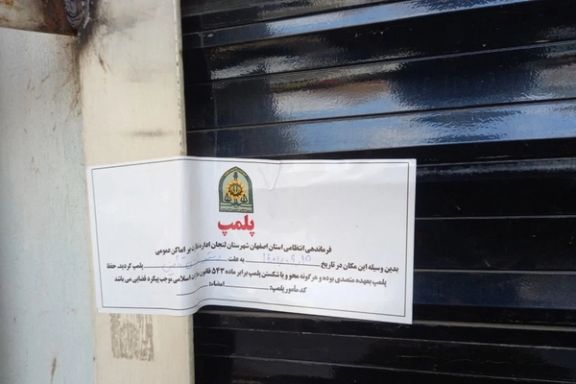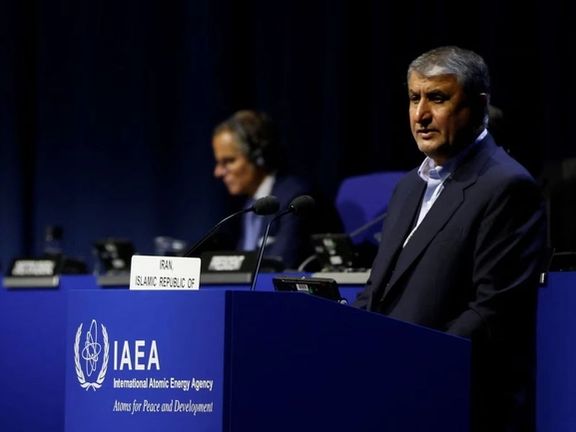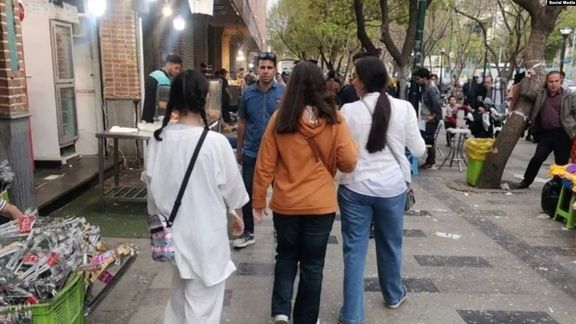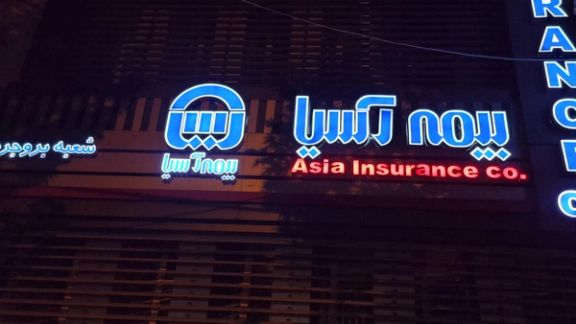50 Businesses Shuttered In Iran's Qom Over Hijab

A minimum of 50 businesses in Iran's religious city of Qom have been closed down for non-compliance with compulsory hijab regulations.

A minimum of 50 businesses in Iran's religious city of Qom have been closed down for non-compliance with compulsory hijab regulations.
Mehdi Ali-Babaei, the head of the secretariat of the Dey 19 cultural and social headquarters in Qom, revealed on Wednesday that “an additional 65 businesses received written and text message warnings regarding their failure to adhere to the hijab regulations.”
The crackdown on businesses is part of a broader response by the Islamic Republic to civil protests against mandatory hijab, which have gained momentum following the death of Mahsa Amini in custody last year. Amini's arrest, labeled as "unfitting hijab" by morality police, triggered months of protests across the country.
In recent months, authorities have implemented stringent measures to enforce hijab rules, including the impounding of cars if passengers defy hijab regulations. Additionally, businesses such as cafes, restaurants, and shopping malls have been shut down for non-compliance, and celebrities who defy hijab rules have been barred from acting in films.
On September 20, the Iranian parliament approved the "Chastity and Hijab" bill, which proposes severe penalties for opponents of compulsory hijab. Originally drafted by the government and later modified by the parliament's hardliners, the legislation suggests various penalties, including substantial fines for women who do not adhere to the prescribed dress code of the Islamic Republic. This dress code mandates a headscarf covering all hair and shoulders, a loose long tunic with long sleeves, and trousers that cover the legs below the ankles.

Iranian authorities have rejected the International Atomic Energy Agency's (IAEA) claims it has stepped up uranium enrichment, calling it "a media frenzy".
The head of Iran's Atomic Energy Organization, Mohammad Eslami, described the report as "political" and a ploy by the US and Israel to divert public attention from the ongoing conflict in Gaza.
The IAEA report, published by Reuters on Tuesday, indicates that Iran has resumed its uranium enrichment program after a short hiatus since mid-2023. It claims Iran currently enriches uranium up to 60% at its Pilot Fuel Enrichment Plant (PFEP) in the Natanz complex and its Fordow Fuel Enrichment Plant (FFEP) in a mountainous area.
Eslami insisted that the Islamic Republic was simply following its "current activities" as defined by international laws.
The White House called the report "very concerning". In a statement on Tuesday, a spokesperson for the National Security Council said: "Iran’s nuclear escalation is all the more concerning at a time when Iran-backed proxies continue their dangerous and destabilizing activities in the region, including the recent deadly drone attack and other attempted attacks in Iraq and Syria and the Houthi attacks against commercial shipping vessels in the Red Sea."
The tension between Tehran and Washington has escalated since Israeli forces allegedly killed a top IRGC commander in Syria this week with Iran-backed proxy groups stepping up attacks on US forces in the region.

While Iran’s ruler Ali Khamenei says he wants a high-turnout election in March, his followers show no intention to give a fair chance to their rivals, the Reformists.
In recent days, several politicians have suggested that the Reformists, who have been cut out the previous two elections, should nevertheless urge the apathetic voters to go to the polls.
Reformist groups feel the call for their participation is meaningless as nearly all their well-known candidates have been already disqualified by the Interior Ministry in the first round of a non-democratic vetting scheme. While the interior ministry can disqualify any person without offering a convincing reason, the Guardian Council takes a second stab and can equally disqualify more candidates.
Former lawmaker Morteza Alviri, a Reformist politician, told Khabar Online that key Reformist politicians such as former President Mohammad Khatami, Former Public Prosecutor Mohammad Khoiniha and former Interior Minister Abdollah Nouri's silence about the elections is in fact their protest action against the current situation.
Alviri, who served in parliament twice in the 1980s, explained that many prominent Reformist figures are reluctant to register their candidacy due to skepticism about the biased vetting system controlled by ultraconservatives. He added that the exclusion of Reformists in recent elections has left them disheartened. Despite Khamenei's call for political participation, Alviri believes that any Reformist who advocates for it risks damaging their reputation.
What Alviri did not mention is that, while Khamenei mildly criticized the Interior Ministry for disqualifying Reformist figures like the current MP for Tabriz, Massoud Pezeshkian, he refrained from advising the Guardian Council to approve the qualifications of any remaining Reformist candidates. This is likely because there are no significant Reformist candidates left for the Guardian Council to vet.
Other pro-reform political figures, such as Mohsen Hashemi, who say they are waiting for the Guardian Council's decision, belong to centrist parties such as the Executives of Construction.
These parties were not that popular with voters in the previous elections when they won less than 3 percent of the votes and the previous Presidential elections in which their members and supporters refused to work for the party's candidate former Central bank Governor Abdolnasser Hemmati. The former leader of the Executives of Construction Party Hossein Marashi has told the press that it was a mistake not to vote for Hemmati. it was a mistake that led to a major defeat for the party."
Some moderate figures such as former President Hassan Rouhani have said that if the majority of the people refuse to take part in the upcoming elections, that would be a great gift to hardliners who currently control the government and the parliament. However, Rouhani who appears to be heeding Khamenei's call for advocating participation, is said not to have enough suitable people around him to fill the list of 30 candidates for Tehran. His party members said he might give a list of only 16 moderate politicians.
Former reformist President Mohammad Khatami in previous years played a key role in encouraging the people to go to vote, but as Alviri has pointed out, the people are no longer so naïve as to listen to such advice. Khatami who is also sulking with the regime that has ignored him for so many years, is now even questioning the regime's legitimacy. He said in a recent statement to a women's human rights gathering in Tehran: "A political regime can be justified only when it can be reformed, and that is when it respects human dignity and gender equality."

Kazem Sedighi, the Friday prayer Imam in Tehran, has proposed educational courses aimed at individuals not following mandatory hijab regulations.
Sedighi stressed on Tuesday, "We are actively engaged in social reform," claiming that “those not following hijab rules are not defiant but rather lack awareness, underscoring the need for educational interventions.”
It comes after last year's Woman, Life, Freedom uprising protests, sparked by the death in morality police custody of Mahsa Amini, arrested for not wearing the hijab properly.
In September, the Iranian parliament greenlit a bill titled "Protection of Family Through Promotion of Hijab and Chastity Culture." Initially introduced by the government and subsequently amended by parliamentary hardliners, the legislation outlined penalties, including substantial fines, for women diverging from the prescribed Islamic dress code. The code mandates a headscarf covering all hair and shoulders, a loose long tunic with extended sleeves, and trousers covering the legs below the ankles.
Surprisingly, the constitutionally mandated 12-member Guardian Council, wielding ultimate authority over legislation, rejected the bill. The Council cited formal deficiencies, including the ambiguity of specific terms in the text, prompting a call for parliamentary revisions.
While some speculate that the rejection stems from formal issues, others posit that the Guardian Council may be cautious about potential increased public discontent before the upcoming parliamentary elections in March. The preceding elections recorded the lowest voter turnout in the four-decade history of the Islamic Republic and in the midst of a dire economic depression and national discontent, low turnout is expected once again.

A joint statement has been issued by 170 prominent political, social, and cultural activists in Iran condemning the Islamic Republic's governance priorities.
The group of activists expressed concern over the government's emphasis on the mandatory hijab policy, labeling it as the country's top priority while neglecting pressing issues affecting the nation such as poverty and corruption.
The activists present a damning array of statistics to underscore the severity of the situation. These include “a disturbing 40% increase in suicide rates over the past decade, a mere 14% economic participation rate for women, a 60% growth in households covered by relief committees over five years, and the exclusion of 930,000 students from education in the past year.”
Additionally, high unemployment rates among university graduates and thousands of unnatural deaths, including incidents like traffic accidents, are cited as indicators of the nation's suffering.
Amidst the challenges, the activists argue for a shift in focus towards “organized, disciplined, and non-violent protests, civil disobedience, and the fostering of organized unity among activists, particularly the younger generation.” They emphasize the need for a “unified front to address the significant economic issues plaguing Iran, such as severe inflation, declining purchasing power, and the expansion of poverty.”
Notable figures among the signatories of the statement include Abolfazl Ghadiani, Alireza Rajaei, Keyvan Samimi, and Parvaneh Salahshouri.

Anonymous hackers are selling 160 million customer information records cobbled together from 23 Iranian insurance companies for approximately $75,000.
The Iranian Leakage Tracking System (Leakfa) has confirmed the validity of the hackers' claim, stating that the information was obtained through a breach of the Expert Information Technologists (Fanavaran) company infrastructure.
The information offered for sale on the dark web includes details such as name, national number, date of birth, address, zip code, and mobile phone, all the data needed to possibly forge identities. The report of the hack first was published by a Telegram channel in August.
Since August, Fanavaran Company, which describes itself as "the largest information technology company in the insurance industry in Iran", has blocked internet access to its website.
Mehdi Imanimehr, Deputy Chief Executive Officer of the company questioned the validity of the hacking, in an interview with the Digiato website. But he also emphasized that he does not have the legal authority to comment on the matter.
Iran's Central Insurance Company (CIC), a regulatory body for the Iranian insurance industry, had denied the hacking in a statement published weeks after the news broke out.
However, in September, the Economy Minister dismissed the CIC's head Majid Behzadpour, and appointed Ali Ostad Hashemi to the position.
The new head's appointment has been the subject of considerable criticism by insurance activists, according to Etemad News.
As an ally of the Economy Minister, Ostad Hashemi lacks any related job experience in the field, and the Supreme Audit Court of Iran has declared it unlawful for him to perform the job because he also holds another position, Etemad reported in September.
During the new government's tenure that began in 2021, many changes have been made as the downward spiral of government-owned insurance companies intensifies.